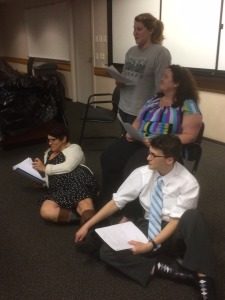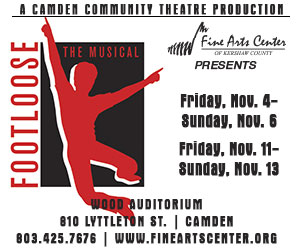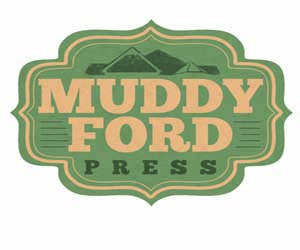Feminism.
Man-hating, bra-burning, hairy women running around and shouting, “Down with the patriarchy!”
…Right?
Wrong.
While it’s true that some women don’t wear bras, some may not be interested in men, some don’t want to shave, and some are absolutely sick of the patriarchy, those behaviors and attitudes don’t define the whole movement. Feminists are not merely some stereotype running rampant through the streets, seeking to gain the upper hand over men. Feminism is simply “the belief in the social, economic, and political equality of the sexes.”
“Feminism means a lot to me, in a lot of different ways, but most importantly it’s a social movement and a way of being that seeks equality for all people, regardless of gender, race, class, sexual orientation, and so on,” says Alexis Stratton, who is co-directing of the reading of the play We Are Women! for the Women and Gender Studies Program’s 40th anniversary celebration, explains.
“Because of negative stereotypes, a lot of people think feminists are ‘man-haters’ or want to put others down, but it’s actually just the opposite. I think most feminists want to bring everyone up and want equality for everyone,” she continues. “And while the focus has predominantly been on women, we have to understand that everyone exists at an intersection of identities, and one is not free until all are free. I also think it’s important to note that there’s no singular ‘feminism,’ but instead, there are ‘feminisms’—plural, because there are so many kinds of feminism, and I think they should all be welcomed and celebrated and recognized.”
Stratton, a program graduate and published author who currently works at South Carolina Equality, is co-directing with Suzanne Vargas, a local clinical social worker and former high school English teacher with a similar passion for melding arts and politics. “Alexis asked me to help her with the production because she knew that I have directed Vagina Monologues before, and am a huge believer in art as advocacy,” shes says. “I love new adventures, especially when they include ways to commemorate the individuals who came before us.”
The play itself was produced by the Women and Gender Studies program in 1995 and features a series of unrelated vignettes that are connected through the women in them.
“The play has a very 1990s, second wave feminism feel to it—a kind of ‘we are women, hear us roar’ feel that reminded me a lot of the feminism of my mother,” says Stratton. “As a queer, gender non-conforming woman, I have a complicated relationship with ‘womanness’ and have only grown to understand and accept my identity as a woman and a feminist by deconstructing what it actually means to be ‘woman.’ So to have ‘womanness’ spelled out so plainly before me in this play, I was initially frustrated, because as a queer and feminist scholar in the 2010s, I’m immediately struck by the question, what does ‘we are women’ even mean? And can we even say ‘we are women’ anymore? And does that ‘woman’ actually include me?”
Ultimately, Stratton believes it does. “I couldn’t get to the point of asking these questions if these women who came before me hadn’t pushed the lines and boundaries that they were able to push—and able to push only through their tenacity and sacrifice and hard labor and boundary-crossing,” she explains. “So once I allowed myself to see that, to get out of the blindness of my of presentism, I became quite attached to the play and really excited about producing it—and seeing what kinds of energy and ideas the cast could bring to it.”
While the piece holds on to some of the second-wave feminist ideals, Vargas and Stratton worked together to modernize it and make it more relatable to current audiences and what they may experience as women of the 21st century.
“It wasn’t until Alexis and I talked about how this is a historical piece honoring where we’ve come from and hope to go that I absolutely fell in love with it. It’s made me much more aware of how, in order to understand what we are advocating for currently, we must know where we’ve been,” Vargas says. “When Alexis brought up the possibility of also adding a few more modern pieces to make the performance capture intergenerational and intercenturial voices, I began to see the piece as snapshots through several generations advocating; and in that I find so much beauty. That’s why I wrote “My Kind of Woman,” because it’s a story and a voice that not only captures my own relationship with feminism and womynism, but also it speaks to a civil rights issue that is so prevalent today.”
The question of whether or not feminism is relevant and necessary today has been raised frequently as movements like “Meninism” and Women Against Feminism arise.
“The world needs feminism, period,” Stratton says flatly. “The world needs feminism(s) because it teaches people to look at the world, to interrogate it and explore it and imagine how it could be different, more just and more whole. And then it gives folks the tools to make that new world happen, even if it’s a struggle, and even if we argue about how to get there. And those struggles are okay, because feminism(s) also teaches us how to work through those differences and arguments in real and productive ways.”
The co-directors and actors have worked hard to put together something entertaining, but also something living, breathing, and real to help teach what feminism is really all about.
“I am just blown away at seeing such amazing individuals put so much love and individuality into a supportive and beautiful artistic community,” says Vargas. “I think often about how I hope this is what developed 20 years ago when they did this play. I also grow more attached to certain pieces; I get excited when I know they’re coming, because each time they’re read, I feel a different woman’s story in it, if that makes sense.”
We Are Women! is a free, a one-night-only event this Friday, March 20th, at 7 p.m. in USC’s Law School Auditorium. Come out to celebrate the past, present, and future of women and watch their stories come to life.
“We don’t live in a post-feminist America, just as we don’t live in a post-racial America,” Stratton stresses. “Feminisms are real and alive and meaningful today—as you’ll be able to see in these actor-activists on stage.”







.jpg)